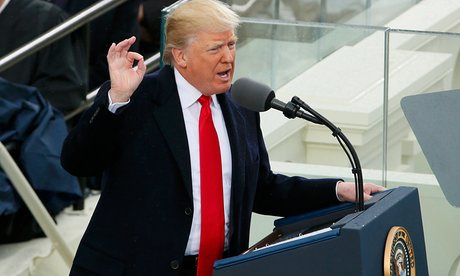Monday
Some are saying that Donald Trump’s inauguration address will hereafter be called “the American Carnage” speech for its most memorable (although factually inaccurate) image. When I heard the words, a stanza from Tennyson’s In Memoriam came to mind. Thinking of the 1848 French Revolution, the poet speaks of “the red fool fury of the Seine”:
And all is well, tho’ faith and form
Be sunder’d in the night of fear;
Well roars the storm to those that hear
A deeper voice across the storm,
Proclaiming social truth shall spread,
And justice, even tho’ thrice again
The red fool fury of the Seine
Should pile her barricades with dead.
No one has died in our own case, but Trump aroused an emotional fury that carried him to the White House. It is therefore comforting to hear Tennyson tell us that all will be well if we listen to “the deeper voice” of social truth and justice:
Will we hear this deeper voice? Does the arc of history bend towards justice? Poetry is encouraging in this regard.
I say this even as I acknowledge that poetry seems powerless to stop Trump. Auden says as much in “In Memory of W. B. Yeats” when he writes, “poetry makes nothing happen.” But that doesn’t make poetry any the less essential at times like these. Auden goes on to say that poetry survives because, in our “ranches of isolation” and our “busy griefs,” in the “raw towns that we believe and die in,” poetry grounds us and gives us a language:
For poetry makes nothing happen: it survives
In the valley of its making where executives
Would never want to tamper, flows on south
From ranches of isolation and the busy griefs,
Raw towns that we believe and die in; it survives,
A way of happening, a mouth.
In other words, poetry works slowly and under the radar so that it may well appear as “nothing” to those in power. It certainly appears as nothing to our current chief executive, who doesn’t plan to tamper in poetry’s valley. (Note the absence of a poet at this year’s inauguration.) But don’t underestimate the power of a mouth. When we articulate our condition, we are on the way to making things happen. It is an important first step towards action.
The need to find a voice accounts for the many allusions to poetry that have been popping up in response to the inauguration. Joyce Carol Oates, for instance, tweeted out the final lines of a very relevant Yeats poem, “To a Friend Whose Work Has Come to Nothing.” The poem’s mention of one who, despite his “lies,” is “neither shamed in his own/Nor in his neighbors’ eyes” seems particularly apt given Trump’s penchant for non-stop lying and for the GOP’s refusal to call him out:
Now all the truth is out,
Be secret and take defeat
From any brazen throat,
For how can you compete,
Being honor bred, with one
Who were it proved he lies
Were neither shamed in his own
Nor in his neighbors’ eyes;
Bred to a harder thing
Than Triumph, turn away
And like a laughing string
Whereon mad fingers play
Amid a place of stone,
Be secret and exult,
Because of all things known
That is most difficult.
What is this “harder thing than Triumph” that we are honor bred to? I would say, a commitment to Tennyson’s “social truth and justice.” We may, at present, be living “amid a place of stone”—which is to say, in hard times—but we can still exult in that commitment, difficult though it may be.
